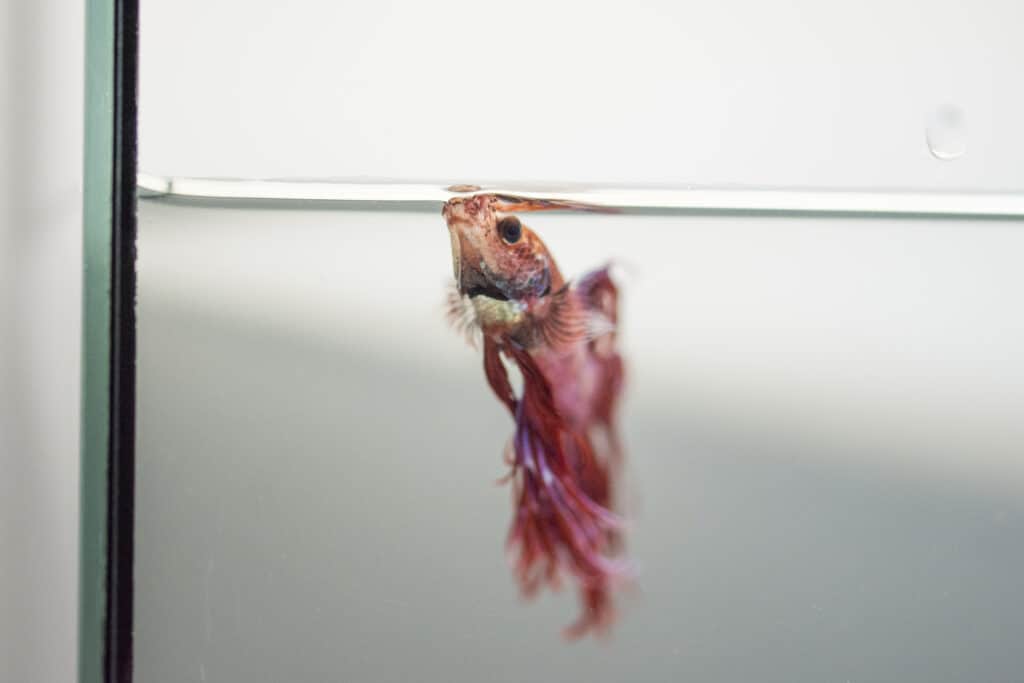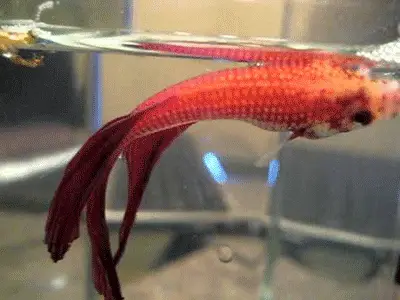Originally posted on May 18, 2023 @ 4:00 pm
Last Updated on 3 weeks by admin
Betta fish are one of the most popular fish types to keep as a pet due to their vibrant colors and unique personalities. However, one of the most common concerns among betta fish owners is how to tell if their fish has passed away.
In this article, we will explore the signs that may indicate your betta fish has died, as well as some common misconceptions about betta fish death. By learning what to look for, you can ensure that your betta fish receives the proper care and attention it needs to live a healthy and happy life.
To know if a Betta fish is dead, look for signs such as the fish not moving or breathing, the eyes being cloudy, or the body appearing stiff. You can also gently nudge the fish or touch its eye with a clean object to see if it reacts. However, make sure not to assume the fish is dead until you are absolutely sure as it may just be sleeping or in shock.

How Do You Know if a Betta Fish is Dead?
Betta fish, also known as Siamese fighting fish, is a popular pet among fish enthusiasts because of their vibrant colors and easy maintenance. However, despite their hardiness, they are still prone to illnesses and death. It is important for owners to know how to spot a dead betta fish to properly dispose of it and prevent the spread of disease. Here are some signs to look out for:
Physical Signs
The first sign to look for is the physical appearance of the fish. A dead betta fish will not move, and its body will be stiff. Its eyes will be cloudy and sunken, and its gills will not be moving. Additionally, its body will start to decompose, leading to a foul odor and discoloration.
If you suspect that your betta fish is dead, you can gently touch it with a net or your finger to see if it moves. If it does not, it is most likely dead.
Behavioral Signs
Another sign to look for is the behavior of the fish. A dead betta fish will not respond to any stimuli, such as food or movement. It will not swim or interact with other fish in the tank.
If you notice that your betta fish has been inactive for an extended period of time, it is important to check if it is still alive. Sometimes, betta fish can appear to be dead when they are actually just sleeping or experiencing stress.
Disposing of a Dead Betta Fish
If you have confirmed that your betta fish is dead, it is important to dispose of it properly. Leaving a dead fish in the tank can lead to the spread of disease and contamination of the water.
The best way to dispose of a dead betta fish is to wrap it in a paper towel or plastic bag and place it in the trash. Do not flush it down the toilet or throw it in a body of water as this can harm the environment.
Preventing Betta Fish Death
While betta fish are hardy, they are still prone to illnesses and death. To prevent this from happening, it is important to provide them with a clean and well-maintained tank. This includes regular water changes, proper filtration, and a balanced diet.
Additionally, it is important to monitor the behavior and physical appearance of your betta fish. Early detection of illness can prevent it from spreading and causing death.
Benefits of Owning a Betta Fish
Despite the risks, owning a betta fish can have many benefits. They are low maintenance pets that can provide companionship and relaxation. Watching their vibrant colors and graceful movements can be a calming experience.
Additionally, betta fish have been known to lower stress levels and blood pressure in humans. They are also great pets for small spaces, such as apartments or dorm rooms.
Betta Fish vs Other Fish
Compared to other fish, betta fish have a more aggressive nature and cannot be kept with other fish. They require a specific tank set up and diet, which can make them more difficult to care for than other fish.
However, their vibrant colors and unique personalities make them a popular choice for pet owners who are looking for a low maintenance and visually appealing pet.
Conclusion
In conclusion, knowing how to spot a dead betta fish is important for proper disposal and disease prevention. Owners should monitor the behavior and physical appearance of their betta fish to prevent illness and death.
While owning a betta fish can have its risks, the benefits of companionship, relaxation, and stress relief make them a popular choice among pet owners.
Frequently Asked Questions
Knowing if your betta fish is dead can be a bit tricky, especially if you are not familiar with their behavior. Here are some frequently asked questions regarding the matter.
How do you know if a betta fish is dead?
There are several signs that your betta fish may be dead. The first sign is that they are not moving or swimming. If you notice that your betta fish is not moving, try tapping on the glass or touching the fish with a net to see if they will move. If the fish does not move, it is likely that they are dead.
Another sign that your betta fish may be dead is if they are floating to the top of the tank. This can be a sign of a few different things, including illness or death. If you notice that your betta fish is floating to the top of the tank, it is important to check if they are still breathing.
How long can a betta fish survive without air?
Betta fish are able to survive for a short amount of time without air. However, they do need air to survive and cannot live without it for an extended period of time. If your betta fish is out of the water, they will only be able to survive for a few minutes before they start to suffocate.
If you notice that your betta fish is out of the water, it is important to act quickly. Place the fish back in the water and observe their behavior. If they are not moving or breathing, it is likely that they have already passed away.
Can a betta fish come back to life?
Unfortunately, once a betta fish has passed away, they cannot come back to life. It is important to properly care for your betta fish to ensure that they live a long and healthy life. Some signs that your betta fish may be sick include not eating, lethargy, and discoloration.
If you notice any of these signs, it is important to take action to help your betta fish. This may include changing the water in the tank, adjusting the temperature, or providing medication to treat any illnesses.
What should you do with a dead betta fish?
If your betta fish has passed away, it is important to dispose of the body properly. You can bury the fish in your backyard or take it to a pet cemetery. Some pet stores may also have programs in place to properly dispose of dead fish.
It is important to avoid flushing the fish down the toilet, as this can be harmful to the environment. Additionally, it is important to properly clean and disinfect the tank to prevent any illnesses from spreading to other fish in the tank.
How can you prevent your betta fish from dying?
The best way to prevent your betta fish from dying is by providing proper care and maintenance for their tank. This includes regularly cleaning the tank, providing proper filtration and lighting, and feeding the fish a balanced diet.
It is also important to monitor the behavior of your betta fish and look for any signs of illness or distress. If you notice any changes in behavior or appearance, take action to address the issue before it becomes more serious.

10 ways to tell if a betta fish is dying – Betta fish informational video
In conclusion, it’s essential to know the signs of a betta fish’s death to ensure that you can take the necessary steps to prevent it. Always observe your betta fish’s behavior and appearance regularly to identify any potential health issues. Remember, prevention is always better than cure, and taking care of your betta fish’s overall health and well-being is crucial to keep them happy and thriving in their aquarium.
Moreover, if you notice any abnormal behavior or physical changes in your betta fish, try to isolate them from other fish in the tank and provide them with proper care and attention. You can also consult with a veterinarian who specializes in fish health to diagnose any underlying health problems that your betta fish may have.
Lastly, it’s vital to handle your betta fish with care and follow proper aquarium maintenance protocols. Keeping the tank clean and providing a healthy and balanced diet can go a long way in ensuring that your betta fish lives a long and healthy life. With a little bit of effort and attention, you can enjoy the beauty and companionship of your betta fish for many years to come.
